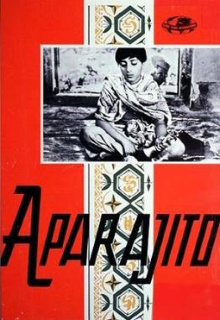This is the middle part of the World of Apu trilogy that began with Pather Panchali. I was dismayed at how the first film existed almost purely to highlight poverty and this is even more so the case here. The life of Apu and especially his mother Sarbajaya is so miserable that this is very painful to watch. Nonetheless as a portrayal of life in India of the period, it is second to none and this particular installment even gives us a look into life in the city. Its depiction of the relationship between mother and son is also considered unusually frank for its era and apparently upset local audiences. It’s not an easy or pleasant film to watch but it is certainly a great one.
Apu and his parents have moved to the city in Benares. His father Harihar works as a priest and seems happy at officiating prayers on the banks of the river Ganges. Yet they are still poor and his wife Sarbajaya has to beg for supplies from neighbors. One day Harihar gets sick and, after asking to drink water from the river, dies. Sarbajaya works as a maid for a time but then decides to return to the countryside. Apu is told to apprentice himself as a priest to an uncle. He learns the job well enough but looks longingly at the other children his age playing and asks to be sent to school. His mother is reluctant at first, worried about the cost. After she relents, Apu does surprisingly well at school and impresses the headmaster, as he makes the school look good to a visiting inspector. Apu grows up into a young man and develops an interest in the wider world after being given books to read. The headmaster encourages him to further his studies in Calcutta with the help of a scholarship. Sarbajaya is dismayed and feels that Apu is abandoning her but doesn’t stop him from leaving and even gives him most of her savings.
This is an even more classical story of poverty than the first film and the priest Apu was apprenticed to sums it up in a single devastating line, “parents don’t stay with you forever”. The move to the city opens horizons for the family yet they don’t succeed in climbing out of poverty with Harihar in particular being as complacent and happy-go-lucky as ever. Apu’s childhood experiences of playing and making friends in the city’s streets is cut short by his father’s untimely yet predictable death. Sarbajaya would have been content to have Apu make a living by being a village priest so it’s almost a tragedy that he turns out to have some aptitude for studying. The knowledge that he gains only alienates him more and more from his mother who sees him drifting away into a world she knows nothing about, yet her love for him prevents her from putting a stop to his dreams. Their lives feel like an endless cycle of suffering, their lives barely above subsistence level, plagued by bouts of illness that they have no money to treat, and inevitably end prematurely with an early death. It is realistic for the era but it also makes this a very difficult film to actually like.
Perhaps the most depressing thing about this film is the fatalistic attitude of the characters. There is no outrage over their lot in life. They don’t even dwell on their losses, they just pick themselves up and go on. The film makes no mention at all of Apu’s sister who died in the first film, and after Harihar dies, that’s it for him too. Judging from his other work, Ray should be no fan of blind religious devotion. There’s no direct critique of religion in this film but Harihar’s fate feels like implicit criticism to me. He seems happy just to teach classes on the banks of the Ganges and to regularly bathe and drink from it. Yet he ends up not only dying an early death but leaves his family with no means of survival. I keep wishing for a scene where Sarbajaya confronts her husband about making hard choices or for Apu to get serious about needing to make money. But this is just not that kind of film and these are not that kind of people. The result that its portrayal of the national character of Indians makes them very passive and accepting of whatever happens to them.
In this end, this isn’t a film that I can enjoy but it’s a true masterpiece in every sense of the word. Its cinematography is beautiful, the performances are exactly what is needed and it truly brings an era that is long gone to life.
